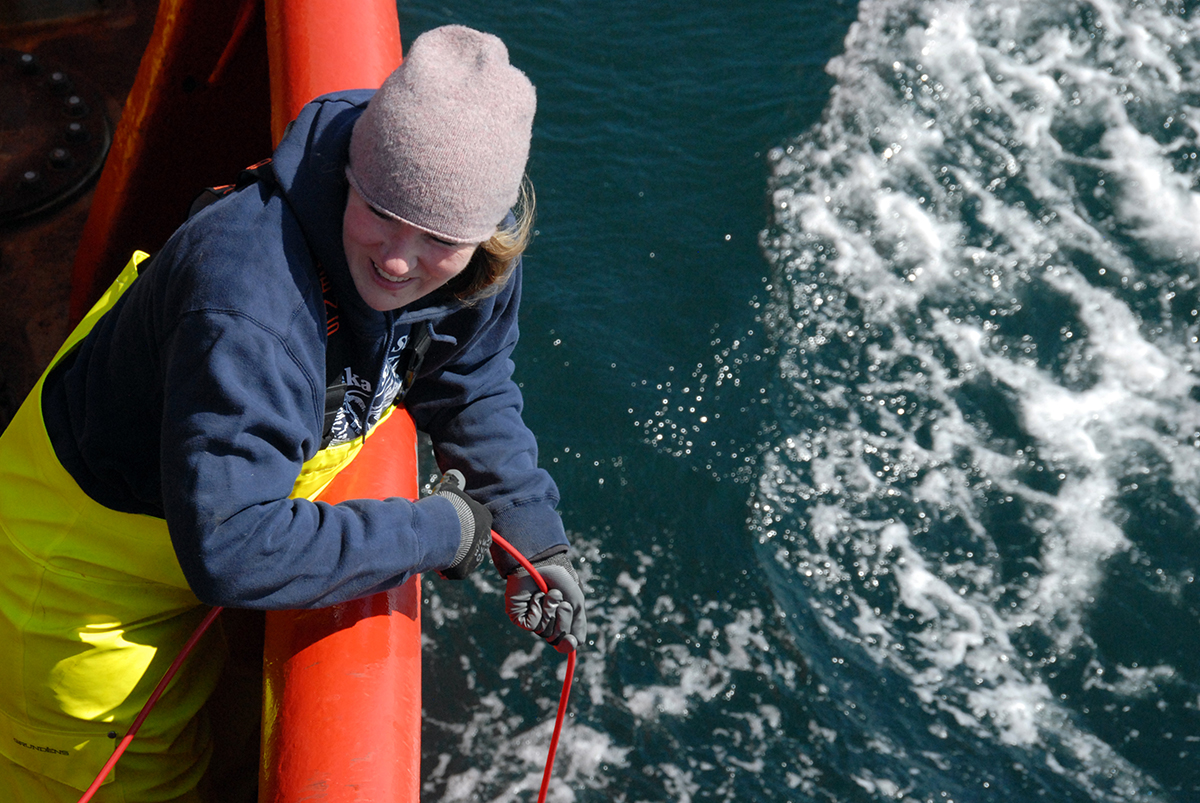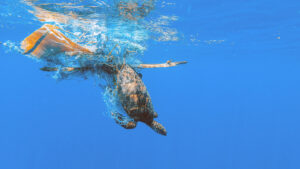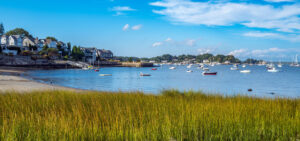Polar scientist finds that decline in sea ice threatens ecosystems
Onboard the Canadian Coast Guard ship Sir Wilfrid Laurier on the Bering Sea in July 2019, Geography Professor Karen Frey deploys instruments that measure the transmittance of light through seawater. Photo by Lee Cooper
The year 2019 was a solemn one for whales, seabirds and ice seals in the Bering Sea, and unfortunately, Clark University polar scientist Karen Frey predicts the future looks bleaker for these sea dwellers and the human indigenous communities that depend upon them as our waters continue to warm, threatening our marine ecosystems.

Frey, who is an associate professor and associate director of Clark’s Graduate School of Geography, is lead author of “Arctic Ocean Primary Productivity: The response of marine algae to climate warming and sea ice decline,” a chapter in the 14th annual Arctic Report Card released today by National Oceanographic and Atmospheric Administration (NOAA) at the American Geophysical Union in San Francisco. Compiled by 81 scientists from 12 nations, the 2019 report recounts the many ways that climate change has continued to disrupt the Arctic over the past year, with near-record high air and ocean temperatures, massive melting of the Greenland ice sheet, record low sea-ice extents, and major shifts in the distribution of commercially valuable marine species.
“The vast majority of the Arctic Ocean has experienced clear, long-term trends of warming over the past several decades, leading to declining sea ice and increased marine plant growth,” said Professor Frey. “The Bering Sea, in particular, has experienced unprecedented declines in sea ice over the last two years, with resulting changes in algae growth to include observations of the presence of harmful algal blooms.”
Some key findings from Frey’s research include:
- All nine regions across the Arctic continue to exhibit increasing trends in marine algae growth over the 2003–2019 period, with the strongest increases in the Eurasian Arctic, Barents Sea, and Greenland Sea regions.
- In May 2019, there was a region approximately 1,500 km long — longer than the length of California — along the sea ice edge in the Greenland Sea that showed 18 times the marine algae of previous years.
- Unprecedented declines of sea ice in the Bering Sea in winter 2018 and 2019 led to shifts in the timing and intensity of marine algae growth in the region. For the second year in a row (during the month of March), we saw increases in chlorophyll biomass in the St. Lawrence Island Polynya region following an early timing of sea ice breakup.
A nationally-recognized expert on polar ice melt, Professor Frey has served as lead author of the Arctic Ocean Primary Productivity chapter each time it has been included in the Arctic Report Card, beginning in 2011. Last year she was one of four scientists who announced the 2018 Arctic Report Card; the report was covered by more than 700 media outlets and reached an audience of an estimated 655 million people worldwide. Throughout her career, Professor Frey, together with her research collaborators, has received funding totaling more than $19 million. In April, she received a 5-year, $571,649 grant from the National Science Foundation (NSF) to continue her collaborative research, “The Distributed Biological Observatory (DBO): A Change Detection Array in the Pacific Arctic Region.”
Professor Frey joined the Clark faculty in 2007 and has made frequent research trips to the Arctic with her students. This summer Frey took doctoral students Clare Gaffey and Luisa Young, M.S.-GISDE ’13, and Sophie Spiliotopoulos ’20 — the first undergraduate to accompany Frey on a research expedition — aboard a Canadian Coast Guard light icebreaker and buoy tender, the Sir Wilfrid Laurier. The team worked together to collect and filter nearly 1000 samples of ocean water from five of the eight Distributed Biological Observatory (DBO) sites across the Bering and Chukchi Seas.
Learn more about the 2019 Arctic Report Card
or watch a video highlighting its findings
First released in 2006, the Arctic Report Card is an annual volume of original, peer-reviewed environmental observations and analysis of a region undergoing rapid and dramatic change.





